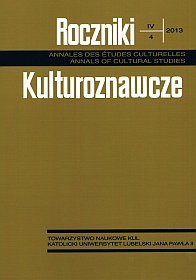Perfection in the Traditional Islamic Ethics
Abstract
Islam is defined as submission to the will of God. The believer should demonstrate his obedience by worshiping the One God and accomplishing His commands, following the right path, revealed to him through the Messenger Muhammad. This path is expressed in the five pillars of Islam: profession of faith in One God, prayer, alms, fasting and pilgrimage. It is the first step (islam) in religion, based on the principle of doing good and avoiding evil. The next step is the faith (iman) in the revealed articles of belief and culminates in a complete trust in God. In the third stage (ihsan) the believer stays in adoration before God and in His presence. He has also the awareness that his inability to see God does not mean that God does not see him. It is perfection, expressed in worship and charity and linking the internal and external dimension of religion in action and doing good. A perfect life on earth and good deeds of man are the way that leads, through the mercy of God, to the contemplation of His face.
References
Abdullah Yūsuf ʿAlī: The Meaning of the Holy Qurʾān. Beltsville, MD: Amana Publications 2008.
Ashraf Ali al-Tahanawi (Imam): The 77 Branches of Faith. http://qa.sunnipath.com/issue_view.asp?HD=7&ID=103&CATE=24 [dostęp: 10.07.2012].
Danecki J., Kozłowska J.: Słownik arabsko-polski. Wyd. III. Warszawa: Wiedza Powszechna 2007.
Danecki J.: Podstawowe wiadomości o islamie. Wyd. II. Warszawa: Dialog 2007.
Gimaret D.: Les noms divins en Islam. Paris: Les Éditions du Cerf 1988.
Ibn Daqîq al-’îd: Imâm an-Nawawî’s 40 Hadîth Explanation. http://abdurrahman.org/sunnah/nawavi40explanation.html [dostęp: 5.07.2012].
Jamal Ahmed Badi: Sharh Arba’een an Nawawî. Commentary of forty Hadiths of an Nawawi. http://www.archive.org/details/FortyHadiths (tekst arabski, tłum. angielskie, komentarz) [dostęp: 5.07.2012].
Koran. Przeł. J. Bielawski. Warszawa: PIW 1986 (http://koran.apologetyka.com/czytaj [dostęp: 1.07.2012]).
Lane E.W.: An Arabic-English Lexicon. Vol. 1-8. Beirut: Librairie du Liban 1968 (http://www.tyndalearchive.com//TABS/Lane/index.htm [dostęp: 1.07.2012]).
Mohamed Baianonie (Imam): Ibadah in Islam. http://www.islam1.org/khutub/Ibadah_ in_Islam.htm [dostęp: 7.07.2012].
Mohammad Razi. Reality of Iman. http://www.learndeen.com/jm/deen-islam/aqueeda-a-tawheed/36/186-reality-of-iman.html [dostęp: 5.07.2012].
Mohammed Fadel: Ibn Rajab’s Commentary on Imam Nawawi’s Forty Hadith. Hadith #1 “Actions are but by intentions”. http://www.sunnah.org/ibadaat/alamal_bilniyyat.htm [dostęp: 7.07.2012].
Muraqaba. http://en.wikipedia.org/wiki/Muraqaba [dostęp: 12.07.2012].
Omar Hasan Kasule Sr.: Change of Fitra. http://omarkasule-03.tripod.com/id702.html [dostęp: 3.07.2012].
Salim Noori: Ihsan – the art of the Sufis. http://www.sufism.in/sufism/ihsan.html [dostęp: 15.07.2012].
Samama Th.: La vertu de religion dans l’islam. Jérusalem: Franciscan Printing Press 1978.
Tafsīr al-Ǧalālayn. http://www.altafsir.com [dostęp: 15.07.2012].
Tafsīr ibn Kaṯīr. http://www.qtafsir.com [dostęp: 3.07.2012].
The Hadith Library (ang.). http://ahadith.co.uk (tekst arabski: http://www.alazhr.com/books2/books.jsp) [dostęp: 1.07.2012].
Wehr H.: A Dictionary of Modern Written Arabic. Edited by J.M. Cowan. Wiesbaden: Otto Harrassowitz 1980.





